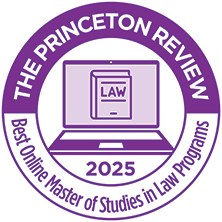
This online law degree is designed for professionals at all levels who need to grapple with the implementation of complex privacy rules.
 Courses cover current laws and practices that impact privacy rights, and professionals
who complete the coursework will be poised to recognize and respond to privacy risks
within their organizations. Knowledge of privacy laws and norms, coupled with awareness
of cyber security issues, will enable employees to mitigate risk and proactively deal
with threats.
Courses cover current laws and practices that impact privacy rights, and professionals
who complete the coursework will be poised to recognize and respond to privacy risks
within their organizations. Knowledge of privacy laws and norms, coupled with awareness
of cyber security issues, will enable employees to mitigate risk and proactively deal
with threats.
This online master’s degree in privacy law and cyber security is offered under the auspices of the newly-developed Institute for Privacy Protection. The Institute focuses on consumer education for privacy protection and on the education of organizations about the privacy issues and legal rules affecting their business operations.
Browse our privacy law courses below. All online courses are designed by a team of Seton Hall Law faculty and industry experts with experience in privacy rights issues and cyber security.
Course requirements for this degree are listed below. Contact us using the form on
this page if you have additional questions or view our admissions requirements here.

Must take all in sequence.
All courses are offered ONLINE only.
Students will learn to:
Students will learn to:
Students will learn to:
Students will learn to:
Must take four courses.
Students may substitute appropriate in-person courses offered at Seton Hall Law School's
Newark campus in place of courses listed below with the prior written permission of
the Associate Academic Director.
Students will learn to:
Students will learn to:
Prerequisite: INDL7550 Cybersecurity I
Students will learn to:
Students will learn to:
Students will learn to:
Students will learn to:
Students will learn to:
Must take two.
Can be from any of the concentration areas (including corporate law courses above).
View Complete Course Information in the University Catalogue →
The Seton Hall University Catalogue is the definitive source for up-to-date course
offerings and degree requirements.
Learn about our programs
On Demand
Graduate Program Webinars
Division of Online Learning
[email protected] | 973-642-8747 or 973-761-9000 ext. 8747